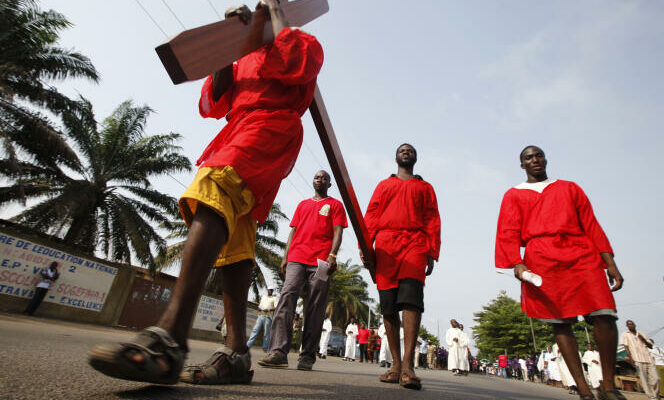On the Ivorian Web, the announcement of the reinstatement of the preacher Do Oulaï Franklin Delaneaux within the diocese of Abidjan delights as much as it disconcerts. For almost four years, the one calling himself “Abraham Marie Pio” was considered persona non grata by the Ivorian Catholic Church.
At issue: accusations of sexual abuse, extortion, financial embezzlement and psychological manipulation made against the one who officiated at the head of the Royal Priesthood, a lay apostolate linked to the Catholic Church of Abidjan and responsible for to teach the Gospel. This community, until its suspension, had thousands of followers, meeting on weekends to participate in collective prayers or listen to the preaching of a leader of growing popularity and influence.
The affair breaks out in the spring of 2020, when alleged victims testified on social networks. Women recount rapes and sexual assaults, while young men speak of the influence of Abraham Marie Pio and his wife, who forced them to carry out their dirty work.
These testimonies push the Archbishop of Abidjan, Cardinal Jean-Pierre Kutwa, to suspend the accused and the activities of his community in June 2020. He also requires the formation of a commission of inquiry. Around forty faithful are interviewed by priests, canon lawyers and psychologists. Abraham Marie Pio recognizes the facts, “all things considered”. Clearly, he pleads guilty, but not to all of the accusations against him, without detailing which ones. Moreover, no legal proceedings have been launched against him, due to the lack of a complaint being filed.
“Laxity” of the Church
In a press release published on February 22, Mgr Kutwa announced the lifting of sanctions. “To the Christian faithful affected by the said abuses […] in these times of Lent when we are invited to forgiveness and reconciliation, receive comfort and peace of heart from the Lord,” can we read in this document. And the archbishop evokes, to justify this reinstatement, the regrets of “this son of the Church” and its participation in “spiritual retreats” as well as “theological, pastoral and psychological training”.
The leader of the royal priesthood is authorized to return to service, but only within the perimeter of the Saint-Ambroise du Jubilé parish, in the Angré district of Abidjan, and under the vigilance of two priests responsible for rereading his speeches.
Precautions deemed insufficient by lawyer Sylvia Apata, specialist in women’s rights. “We ask the victims to forgive, so we recognize that there was a crime. However, he will be handed over under the same conditions as those in which he committed these crimes. This raises questions about the protection of the faithful”, believes the president of the NGO Citizens for the promotion and defense of the rights of children, women and minorities (CPDEFM). According to her, this reintegration is the sign of a “laxity” of the Church with regard to sexual violence against women.
Those who denounced the preacher’s abuses were harassed on social networks, described as “devils” or “temptresses” by Internet users remained faithful to Abraham Marie Pio. A wave of intimidation which explains, according to Mme Apata, why the alleged victims did not dare to file a complaint: “In this context, they cannot take legal action. The simple fact of denouncing exposes them to reprisals. »
Follow us on WhatsApp
Stay informed
Receive the essential African news on WhatsApp with the “Monde Afrique” channel
Join
The lawyer regrets the absence of reporting by the Church to the courts. For its part, the diocese of Abidjan considers that it has managed this matter in accordance with Catholic legislation. “The alleged victims are adults, they are free to go to court,” retorts Father René Agbo, one of the respondent’s supervisors and member of the commission of inquiry.
A message of impunity
In ten years of existence, the apostolate of Abraham Marie Pio has succeeded in uniting a large audience. “The royal priesthood had become a family for many faithful”, remembers René Agbo. Among them, young people and students, but also workers, single mothers or members of the Abidjan clergy. The charm of Abraham Marie Pio even worked in Canada, France and the United States, where his apostolate had branches. On the web TV of the Royal Priesthood or on the airwaves of Ivorian Catholic radio stations, he broadcast his teachings, acquiring the status of a “charismatic leader”.
A popularity which is not unrelated to its reintegration, according to Mme Apata: “The royal priesthood represents a significant financial windfall for the diocese of Abidjan. Donations from the faithful were significant. » In addition to tithing, members paid contributions and participated in collections organized during collective prayers. “When we closed the apostolate, many followers left for Protestant churches. The reintegration of Abraham Marie Pio could contribute to their return,” admits René Agbo, who nevertheless excludes this reason in the decision of Mgr Kutwa: “He would not have lifted his suspension if he had not been convinced of the man’s sincerity. »
According to an estimate from the general directorate of religion, Abidjan has more than 8,000 places of worship and religious associations, more than half of which are affiliated with evangelical Protestant movements. Faced with the proliferation of these new Christian communities, having a preacher as unifying as Abraham Marie Pio is a significant asset for the Catholic Church. “When a knife cuts you, you should not throw it away but polish it and reuse it,” pleads René Agbo.
Abraham Marie Pio will soon have the opportunity to see if his popularity has remained intact. His two supervisors plan his return to the faithful after Easter. A potential return to grace which would send a message of impunity, according to Mme Apata. “I hope that the public prosecutor will take charge of this matter and shed light on these accusationsshe says. Because it would be a shame for a person to admit to acts of a criminal nature without being prosecuted by the courts. »
